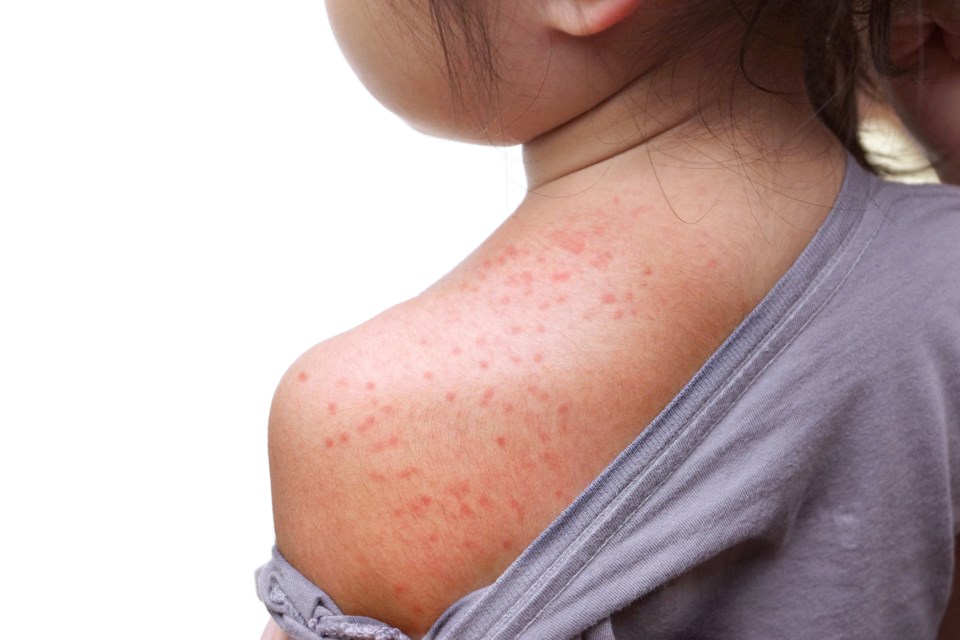A measles outbreak in Norfolk County has hit 21 confirmed cases, with the latest patients possibly exposing people as far away as Newmarket.
Grand Erie Public Health said Monday the new cases are in adults whose infections are “linked to a previous exposure.”
The pair are recovering at home while health officials are busy “following up with known contacts who may have been exposed to the measles virus through these individuals,” health unit spokesperson Shawn Falcao said in a media release.
The health unit said exposure to the highly contagious airborne virus was possible at the family practice office at the Roulston’s Pharmacy on Donly Drive in Simcoe on the evening of Jan. 28, and the Shopper’s Drug Mart on Norfolk Street in Simcoe on Jan. 30, from 10 p.m. until midnight.
The infected residents travelled to Newmarket on Jan. 31, spending the day at the Magna Centre Arena — a multi-pad municipal sports complex — before staying over at the Best Western on Yonge Street, according to the health unit’s list of possible exposure sites.
These cases reflect how easily the virus can move from region to region, as measles symptoms such as runny nose, cough and fever — which can take up to three weeks after exposure to appear — can resemble influenza, health officials say.
More distinctive symptoms include a red rash that begins on the face and small, blue-white spots on the inside of the mouth and throat.
The virus can hang in the air for up to two hours, meaning someone in a hotel lobby or arena bleachers can contract the disease without ever seeing or speaking with the infected person.
However, the two-dose measles vaccine provides nearly 100 per cent protection against infection, said Dr. Malcolm Lock, Grand Erie’s interim medical officer of health, adding the outbreak in Norfolk has “predominantly” affected unvaccinated residents.
Efforts to stem the spread of measles in Haldimand-Norfolk are hampered by measles, mumps and rubella (MMR) vaccination rates that sit well below the 95 per cent threshold needed for herd immunity.
Lock urged residents to make sure their vaccinations are up to date, as some immunizations may have been delayed during the COVID-19 pandemic, and catch up on any missing doses.
Residents who are fully vaccinated should consider themselves “protected and immune from measles,” with no need to curtail social activities, Lock said.
Anyone concerned about the airborne spread of the disease can take precautions such as masking and avoiding large crowds if they so choose, he added.
“But from a medical standpoint, we would not consider that anyone who was fully immunized were at risk of contracting the disease,” Lock said.
From patient zero to outbreak
The health unit announced the region’s first confirmed case on Jan. 10 — an adult who had not travelled and whose source of infection was unknown. At that time, the health unit was able to identify 130 potential contacts and hold a booster clinic, and officials were optimistic there had been no community spread.
Since then, however, the virus has popped up in hospitals, doctor’s offices, classrooms, clinics and hockey arenas in Simcoe, western Norfolk, Woodstock and Tillsonburg in neighbouring Oxford County, and now Newmarket.
Grand Erie and Southwestern Public Health have declared measles outbreaks, as the volume of cases strains their ability to trace contacts, while Six Nations Public Health recently issued a notice to band members informing them of the situation in neighbouring Grand Erie and urging caution and self-monitoring for potential measles symptoms.
As the case count rises, Grand Erie “has activated its emergency management plan at the partial activation stage,” Falcao told The Spectator in an email.
“This involves bringing several teams together to provide a co-ordinated response to the current measles outbreak,” he said.
Staff are busy assessing the risk posed to residents who have had a confirmed measles exposure, he explained.
Residents who are unvaccinated or who have only received one dose are considered “susceptible” and are advised on how to keep themselves safe. That can include getting a second dose, avoiding “high-risk settings” such as schools and health-care facilities, and being treated with immunoglobulin — antibodies designed to prevent or reduce the severity of infection — within six days of exposure.
The latter option is especially appropriate for those at higher risk of serious health outcomes, including infants under 12 months, pregnant people who are not fully vaccinated, and those with compromised immune systems, as the measles virus further weakens one’s ability to ward off infection and disease.
Negative health outcomes from a measles infection, though rare, “can be significant and lead to serious, lifelong illnesses,” Lock said.
J.P. Antonacci is a federally funded Local Journalism Initiative at the Hamilton Spectator
